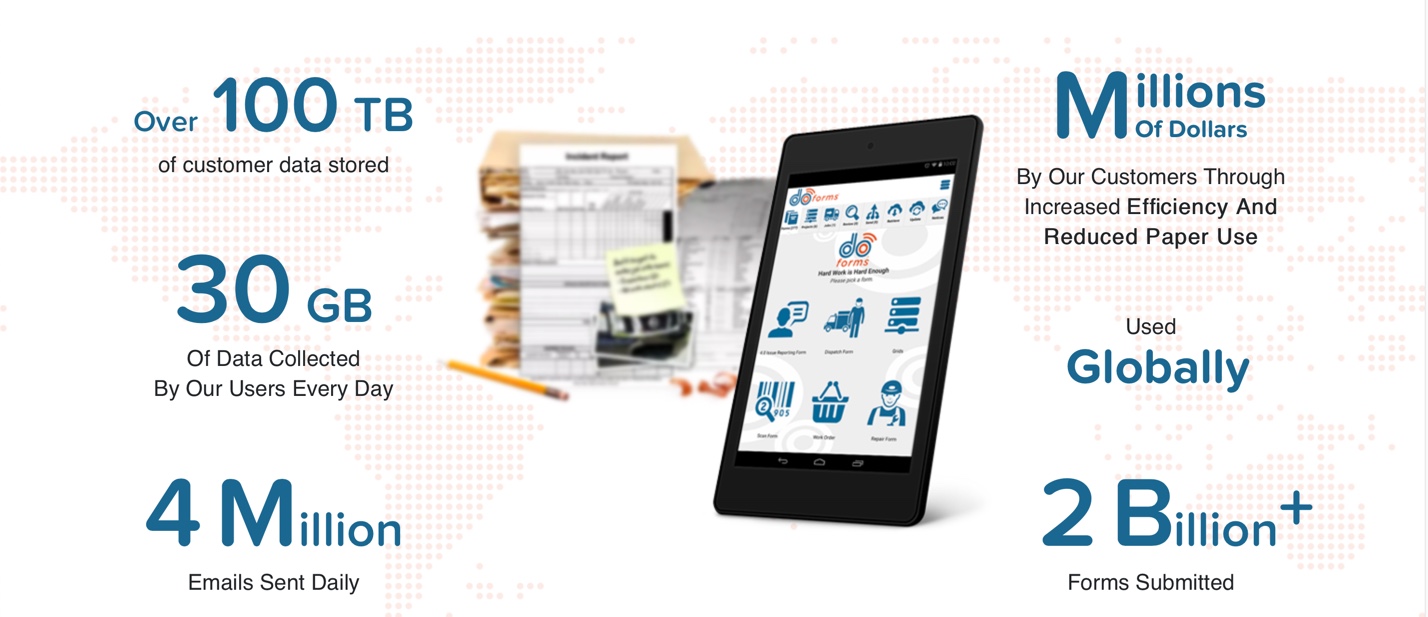
53% of businesses say that mobile apps improve their processes and productivity.
This shouldn’t come as a surprise in a world that now heavily relies on mobile devices for both personal and professional purposes.
Improved processes and productivity directly lead to lower costs and improved bottom lines. That’s why you shouldn’t hesitate if you’re considering to invest in a mobile platform that will power your business.
Mobile forms are among the most accessible tools that can help you streamline the operations of your business.
If you’re not familiar with them, you’ve come to the right place. In this article, we will give you a brief overview of what a mobile form is, how it works, and how it can benefit your business.
Table of Contents
What Are Mobile Forms?
Mobile forms are applications for smartphones and tablets that help you collect and analyze data.
They serve as an alternative to the conventional physical formats of mobile data collection – the often dreaded stacks of paperwork. Mobile forms are easily accessible, shareable and instantaneous.
The goal of mobile form platforms, such as doForms, is to help businesses optimize their data collection and analysis practices.
How Does A Mobile Form Work?
Mobile forms work just like their paper-based predecessors. Depending on the data you need to collect, they will contain customized fields that your customers or employees will fill out.
The supported fields and data formats include:
- Images
- Maps
- Barcodes
- QR codes
- Digital signatures
- Date and time fields
- Free input fields
- Checkboxes
Forms on mobile devices are versatile and offer a high degree of customization, which allows you to build a form that best suits your needs.
Common mobile form uses include:
- Expense reports
- Safety inspection checklists
- Inventory lists
- Customer experience surveys
- Invoices
Mobile forms work with the majority of commercially available mobile devices, from Apple smartphones to Android-based tablets.
They can also include a certain degree of automation, allowing you to schedule automatic report generation, for example.
Mobile form apps are not just optimized to work on devices with smaller screens — they actually benefit from it, by making the data input process more intuitive and logical.

Industries That Use Forms On Mobile Devices
Mobile forms are a versatile tool for data collection and analysis that can be useful to many different businesses in various industries.
Here are just a few examples of industries that rely on mobile eForms:
Industry #1: Logistics And Transportation
One common use case for electronic forms is the logistics industry or any industry that has to do with managing transport.
Monitoring vehicle mileage and tracking deliveries can be a cumbersome task, as it tends to involve lots of reporting and paperwork.
Forms on mobile devices help you avoid that by aggregating all of your logistics management needs in a single app.
Read our HUB Truck case study to learn how eForms helped this business optimize their fleet management processes.
Industry #2: Real Estate
Many real estate and property management companies also rely on mobile eForms to streamline their processes.
For real estate companies that work with dozens or even hundreds of properties, data management can be a daunting task.
Collecting and analyzing data via a mobile app can completely transform real estate and property management processes as an all-in-one tool that supports various data formats.
Pictures, sketches, and geotags can all be compiled in a single form that is stored in the cloud and can be easily accessed by construction workers, real estate agents, and account managers alike.
To see how mobile data collection apps can completely transform global property management, check out our JLL case study.
Industry #3: Humanitarian Efforts
The operational aspect of humanitarian efforts can be quite complex.
Often, they leave little or no time and resources for the people involved to deal with the mundane task of data collection, when more important matters are at stake.
However, data collection is important in humanitarian efforts, as circumstances can leave little room for error or a delay in processing.
A mobile form can help optimize this process by automating some of the data collection and analysis tasks, to speed up the process and ultimately increase productivity.
Read our Community Empowerment Lαβ case study to find out how electronic forms can be an integral part of humanitarian relief.
Benefits Of Mobile Forms
Mobile forms have a few key benefits that make them versatile and effective in optimizing your business processes:
- They are instantaneous: As long as the device that the mobile form is filled out on is connected to the internet, its submission will be instantaneous. This allows for the data to be recorded, analyzed, and stored in a matter of minutes.
- They are easily customizable: You can change the contents of your mobile form in only a few clicks via a mobile form builder, updating it in real-time.
- They are accessible: Almost everyone carries a smartphone today, which means that everyone who needs access to your mobile form (such as employers) will be able to access it, as long as they have an internet connection.
- They are secure: Due to the real-time functionality of eForms, it’s less likely for the data to be falsified or corrupted.
- They save you money: Physical paper forms carry a lot of recurring costs, such as printing, transportation, storage, and recycling. Electonic forms, on the other hand, only require you to invest in devices to access the forms on and pay a regular subscription to continue access.
Conclusion
Mobile form apps can be a great tool for optimizing your processes and workflow.
They are a multifunctional tool that can be customized to fit the needs and goals of your business.
Regardless of what industry you’re in, they will allow you to divert your time and effort from processing paperwork to more worthwhile ventures.
The key benefits of a mobile eForm include:
- Real-time functionality
- Customization potential
- Accessibility
- Safety and security
- Versatility
- Cost-effectiveness




